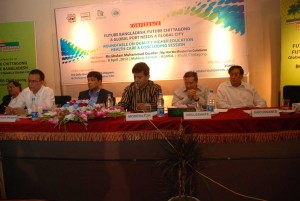


April 09, 2012
Ctg businesses count costs of Dhaka-centric pull
Chittagong entrepreneurs find business climate in the port city unfriendly for investment as they have to depend on Dhaka for taking decisions that costs them time, money and ultimately competitiveness.
From registering a company to getting bank loans, Chittagong has to wait for Dhaka's green light that sometimes wrecks havoc on the businesses.
The views came at a roundtable on “business climate: challenges for growth” at the Chittagong office of Bangladesh Garment Manufacturers and Exporters Association (BGMEA) yesterday.
The Daily Star and Chittagong Research Initiative organised the event with support from BGMEA and AK Khan Foundation as part of the leading English newspaper's 12-day Odommo Chattagram festival.
Poor governance and infrastructure, including a lack of gas and electricity connections and unavailability of land, further complicate the situation and hinder the prospect of Chittagong to become a regional economic hub, analysts said.
“Chittagong is a haven for investment. But we, the entrepreneurs, have to suffer. We have to go to Dhaka frequently to complete formalities even for simple matters,” said Nasir Uddin Chowdhury, BGMEA first vice president.
“It seems that Chittagong has been treated as the country's commercial capital for political gains. Actually the city gets little attention.”
There is no office of the commerce ministry in Chittagong while public offices and branches of banks do not have the authority to take decisions, he said.
The head office of the shipping ministry is also in Dhaka although the port city is a maritime hub, he added.
The BGMEA leader said many entrepreneurs in Chittagong sit idle in the absence of industrial plots and electricity and gas connections. Investors become victims of bureaucratic tangles and poor governance, he said.
Chowdhury said the city has many quality entrepreneurs, but no industrial cluster in the suburbs of Chittagong has yet been developed.
Such cluster could be developed under public private partnership (PPP) to ease pressure on the city and save workers from paying extra house rents for staying in the city, Chowdhury added.
“House rents take away 50 percent of their monthly income. Higher inflation hit them (workers) directly.”
It is unfortunate that no PPP has yet been implemented although four years have gone after the government announced plans for such projects, he said.
M Nasir Uddin, managing director of Pacific Jeans Group, one of the biggest apparel exporters, said high inflation is a concern as it pushes up cost of living of workers.
High bank interest rates on loans and volatility in exchange rates also hurt business and investment here, Nasir said.
“But the biggest challenge for business climate is political stability.” Nasir said economic growth in Asia led by China and India widens scope for Bangladesh.
He said China is forecast to be the biggest economy by 2030 followed by the USA, India and Japan.
Indonesia and Thailand are also on the list of top 30 economies by 2030, he said, adding that 10 countries from the continent will be on the list of top 30 economies by 2030.
He said the size of the Asian apparel market is $70 billion and it will expand with the growth of economies in the region.
“A golden opportunity lies ahead for Bangladesh. We have hands and we need energy and gas to tap the potential.” Asia can become a major apparel market for Bangladesh, the second biggest apparel exporter in 2011 after China.
But he warned: “Train will not wait for us. It will go away. If we miss it, it will be a governance failure.”
The Pacific Jeans chief said the growth of Asia also offers scope for diversifying the market and reducing high dependency on markets in Europe and US for apparel exports.
The consistent growth of India, China, Thailand, Korea, Taiwan and other countries will fuel growth of global retails in these countries and will widen opportunity for Bangladesh, which sells its apparels to global chain retails.
He said Myanmar with a change in political environment may become a competitor for Bangladesh, as developed economies are likely to withdraw sanctions against the country.
He stressed the need for signing bilateral free trade agreements with Myanmar to establish garment factories there, which also has a huge workforce.
“We can also concentrate on furniture and household products as their production costs go up in China.”
Hossain Zillur Rahman, a former caretaker government adviser, said there is scope for making Chittagong a connectivity hub. “But business climate is as important as infrastructure and other issues.”
The port city has been kept suppressed, said Moinul Islam Chowdhury, chairman of Equity Partners.
Businesses wanted the Asian highway to pass through Chittagong, said MA Salam, director of Chittagong Chamber of Commerce and Industry. But no progress is seen in this regard, he said.
The port city branch official of the Registrar of Joint Stock Companies comes to Chittagong once in a week to clear applications, causing delays to businesses, he said.
Mahfuz Anam, editor and publisher of The Daily Star, said: “Time has come to take region-focused development strategy for the overall development of Bangladesh.”

Copyright © 2020, The Bangladesh Garment Manufacturers and Exporters Association.
Version-2.0, Design & Developed by Systech Digital Limited.
Version-2.0, Design & Developed by Systech Digital Limited.
